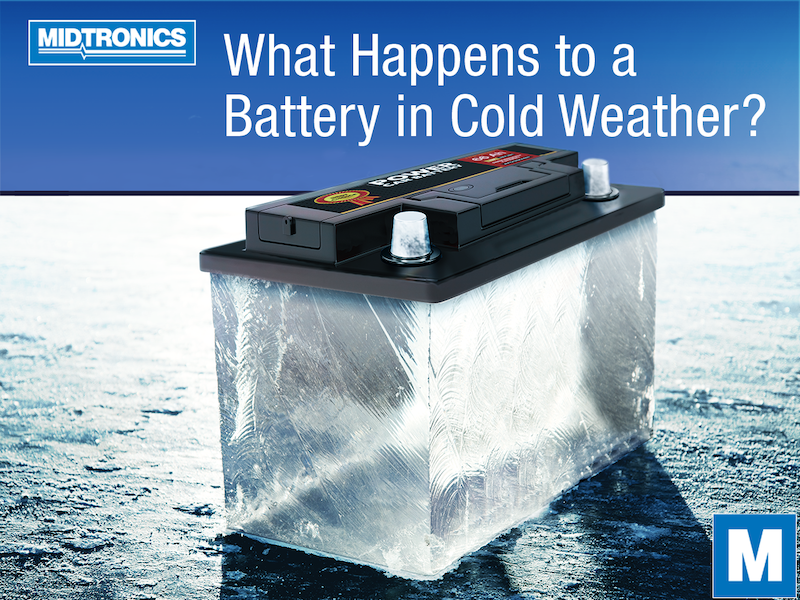Car batteries are essential in any vehicle, providing the power needed to start the engine and run the electrical systems. Even in electric cars, a 12-volt battery is crucial to initiating its functions and operating body systems. However, extreme cold temperatures can have a significant impact on battery performance and capacity. In this blog post, we will explore the science behind how cold temperatures affect car batteries and provide tips on how to maintain and prolong the life of your battery during the winter months.
The chemistry in batteries when it gets cold
First, it’s important to understand the chemical reactions that occur within a car battery. A car battery that’s made up of lead-acid cells uses a chemical reaction to convert energy stored in the form of lead and sulfuric acid into electrical energy. However, this chemical reaction is temperature-sensitive, and cold temperatures can slow down or even stop the reaction from occurring at all. It’s a natural occurrence as lower temperatures reduce kinetic activity.
Slower reactions
When the temperature drops, the electrolyte mixture becomes more viscous, making it more difficult for the chemical reaction to occur. It’s similar to how engine oil gets thicker as the temperature gets colder, and it flows less freely. As you can imagine, ions moving through the electrolyte move slower so, while there is still the same potential energy inside, it discharges at a slower rate.
Frozen electrolyte
As well, the cold temperatures can cause the water in the electrolyte to freeze, which can damage the battery or even cause it to fail. That’s when you see the sides of the case bulging and, in some circumstances, it can crack and leak the electrolyte out, leaving a bunch of corrosion in its wake.
The freezing point of a typical car battery electrolyte is about -40 F, so it is important to ensure that your battery is not exposed to temperatures below this point. If the temperature drops below freezing, the electrolyte in the battery will freeze and expand, which can cause the battery to crack or rupture.
If the battery isn’t fully charged, there’s a risk of freezing at milder temperatures. For example, a battery that is approximately 80% charged could freeze at -20 F. And if a battery is completely discharged when the temperature drops, the water in the electrolyte can potentially freeze at around 30 F.
Reduced capacity
The cold temperature also affects the capacity of the battery. The performance of a car battery is measured in both cranking amps (CA), which is the battery output rating at 32 F, and cold cranking amps (CCA), which is the amount of power the battery can deliver at 0 F for 30 seconds while maintaining a minimum voltage of 7.2V. As the temperature drops, the cranking amperage of the battery decreases, meaning it will have less power to start the engine.
Generally, that’s not a problem with a healthy car battery. The CCA rating accounts for the actual amperage requirements to start the engine, plus a very healthy buffer too. But if your battery is a few years old and has started to sulfate or the lead plates have begun shedding, it’s actual cold cranking amperage could be significantly diminished. If the temperature drops well below freezing, it might not have the stored energy to turn the engine over fast enough to start.
How to prolong a battery’s life in the cold
If you’re among the millions that live in American states and Canadian provinces that get months of deep cold temperatures, it might seem inevitable that you’ll have battery issues at some point. There are steps you can take to promote a healthy battery and keep it working for as long as possible. To maintain and prolong the life of your car battery in cold weather, consider these steps:
- Keep your battery clean and dry. Cold temperatures can cause condensation to form inside the battery, which can lead to corrosion. It dilutes the electrolyte and, in rare instances, it can cause the battery to short circuit too.
- Make sure your battery is properly charged. A fully charged battery is less likely to freeze than one that is low on power. Avoid taking short driving trips, and reduce the electrical consumption in your car while you drive.
- Keep your battery warm. If possible, park your car in a warm garage or install a battery blanket. Some battery blankets can be plugged in, like an engine block heater, to keep the electrolyte warmer and the kinetic energy moving.
- Avoid rapid charging or discharging. Cold temperatures can cause the chemical reactions within the battery to occur at a slower rate, so it’s important to avoid subjecting the battery to extreme conditions. Being a good Samaritan and helping a friend or co-worker jump-start a car is noble, but it can take its toll on your own battery if you do it frequently.
- Choose the right battery for your climate. Some batteries are designed to perform better in cold temperatures than others. Opt for a higher CCA rating where possible to ensure it will still start your car, even after it’s aged a few years.
One of the best practices is to test car batteries before the winter weather arrives. If the testing decision shows that the battery is marginal or it fails the test, it’s best to replace it before you encounter problems. A breakdown due to a failed battery or the inability to start your car in extreme temperatures can leave you exposed to serious health consequences, and it’s easily avoidable by ensuring the battery is in good shape.




